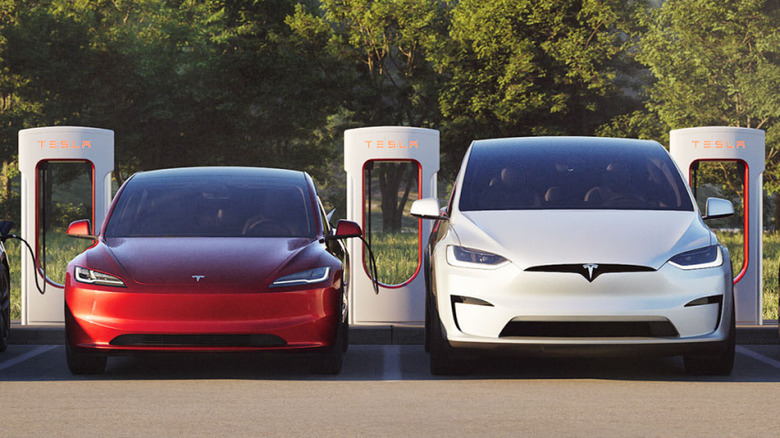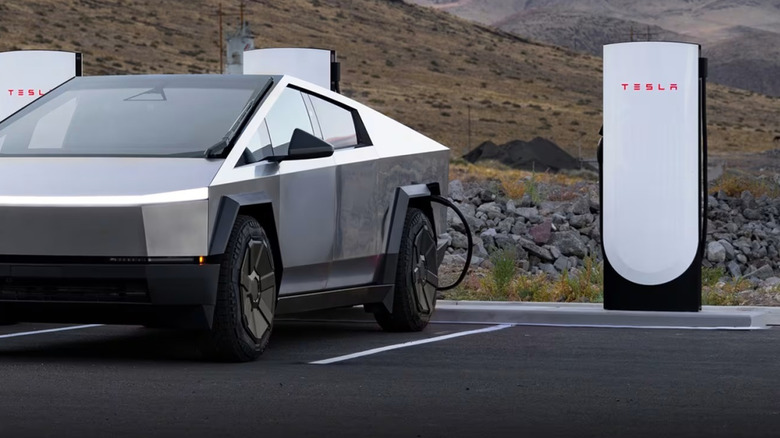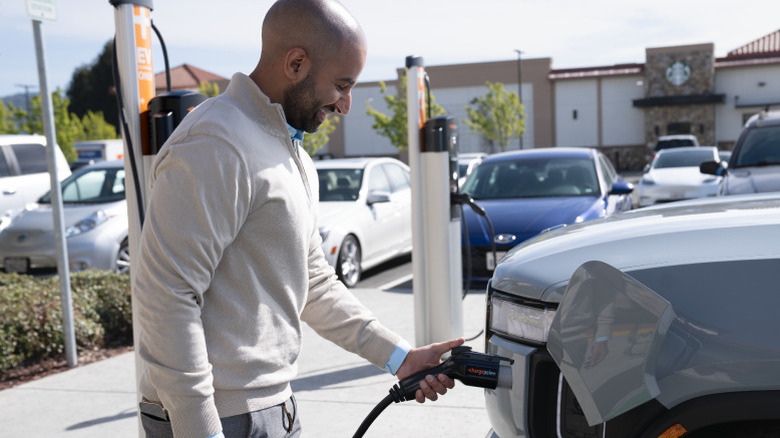ChargePoint Vs. Supercharger: The Two Things Tesla Owners Should Check Before They Plug In
When you got your Tesla, you committed to swearing off gas and completely embracing electric charging. But although this is all well and good (especially for the environment), not every electric car charges at the same speed. The charger you use plays a huge part in determining just how fast your car's battery will be topped up.
Teslas can either be charged at home or out in public. Home chargers are convenient to use since they're always readily available for you, safe from unwanted unplugging, and practically free (apart, of course, from the added bucks to your utility bill). The thing about Tesla's home chargers, though, is that you can't just take them with you and use them when out driving.
If you're going on a long road trip, you'll have to rely on outdoor chargers like Tesla's own Supercharger and the third-party network ChargePoint on your route. Both have tens of thousands of stations across the country. But before you plug into one, there are two things you should consider: cost and charging speed.
Supercharger cost and charging speed
The charging fee at Superchargers varies depending on the site. Some have a fixed cost, while others change their rates based on a schedule. For instance, at the Hegenberger Road Supercharger near Oakland International Airport in Oakland, California, you can expect to pay 39 cents per kilowatt hour from 11 p.m. to 8 a.m., 56 cents from 8 a.m. to noon and 7 p.m. to 11 p.m., and 62 cents from noon to 7 p.m. Meanwhile, in St. Robert, Missouri, the charging fee is 44 cents per kilowatt hour any time of day.
On top of charging fees, Tesla imposes idle and congestion fees to make stations more available to those who really need charging. Idle fees happen when you've already finished charging but don't vacate the charging spot within five minutes. It can cost 50 cents per minute if the site has at least half of its stations in use and $1 per minute when the site is full. Congestion fees, on the other hand, only apply to select locations during their busy hours. You'll be charged 50 cents a minute once you reach an 80% charge or have finished your session and fail to disconnect within five minutes. This way, you'll be discouraged from charging longer than necessary (and you shouldn't charge your Tesla to 100% anyway).
When it comes to charging speeds, Tesla says a Supercharger can add up to 200 miles to your vehicle's range in just 15 minutes. This differs per model, though. A Cybertruck can be topped up with as much as 137 miles in a 15-minute charge, Model Y with up to 162 miles, Models 3 and X with up to 175 miles, and Model S with up to 200 miles.
ChargePoint cost and charging speed
Like Superchargers, ChargePoint stations' charging fees are priced differently based on the location. You'll typically see sites charging by kilowatt hour, but some have a scheduled kilowatt hour cost, hourly cost, fixed rate, or even minimum or maximum fee. For instance, at the ChargePoint station at the El Cortez Hotel and Casino in Las Vegas, it's 30 cents per kilowatt hour. But in Washington Square Village in New York City, the first four hours cost $4 an hour, with subsequent hours billed at $6 per hour. Meanwhile, at the Rollins College Wellness Center in Winter Park, Florida, there's a maximum fee of $10 per session.
You may also incur additional fees at certain ChargePoint stations. Many sites charge a guest fee of 99 cents per session. Others have an idle fee of $1 or $2 per hour, with a grace period as long as two hours, depending on the site. Although many ChargePoint stations require payment, plenty of others can be used for free. Sometimes, these sites are owned by car dealers like the Bill Byrd Kia in Panama City, Florida or city governments, such as the Sante Fe Station in Oklahoma City.
Superchargers are DC fast chargers that charge at up to 250 kilowatt-hours, while most ChargePoint stations are of a lower level of EV charging. You'll often find Level 2 ChargePoint sites, which will only provide you with up to 50 miles of additional range for an hour of charging. ChargePoint does offer DC fast charging locations that can deliver over 180 miles per hour from their 125-kilowatt-hour charging rate. However, there are fewer of them than the Level 2 AC stations, and they still won't charge your Tesla as quickly as Superchargers.


